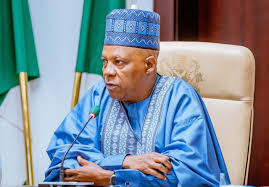Vice President Kashim Shettima has asserted that the recent Supreme Court ruling granting full financial autonomy to local government councils will significantly enhance Nigeria’s universal basic education system. Speaking on Thursday at the public presentation of the book “Navigating the Politics of Universal Education Policies in Nigeria,” authored by former Deputy Governor of Ekiti State, Professor Modupe Adelabu, at the NAF Conference Centre, Abuja, Shettima highlighted the transformative potential of this decision.
He noted that the autonomy granted to local governments, which bear the primary responsibility for delivering education at the grassroots level, would address the financial constraints that have historically impeded the alignment of administrative efforts with national educational objectives.
“As stewards of the nation, His Excellency President Bola Ahmed Tinubu is leading reforms to overcome the ideologies and challenges that have long frustrated universal education in Nigeria,” Shettima stated. “The lack of local government autonomy has created significant financial barriers, preventing the effective alignment of administrative units with our educational agenda. The recent Supreme Court judgement empowering local government councils to control their resources brings government closer to the people and offers new hope for our educational initiatives.”
The Vice President urged all levels of government to focus on policies that empower those implementing educational initiatives at the grassroots. He also lauded President Tinubu’s introduction of the Student Loan Scheme, which aims to secure the future of Nigerian children by ensuring that every student has access to loans for their education. According to Shettima, the Nigeria Education Loan Fund (NELFUND) has already received an overwhelming number of applications, marking a significant milestone in the country’s educational development.
“This initiative is a landmark achievement, signaling a bright future for our youth. While making education universally accessible is essential, our experience shows that incentivizing education is the most practical path forward. This is why we must all, across all levels and branches of government, join this campaign to educate the nation,” Shettima emphasized.
He further pointed out the urgent need for action to ensure that education is both accessible and desirable for every Nigerian child, highlighting the significant number of school-age children not attending or completing their education, as well as the persistent gender disparities in literacy.
The Vice President praised Professor Adelabu’s book for offering valuable insights and solutions to some of the most pressing challenges confronting policymakers in Nigeria’s education sector. He expressed confidence that the book would inspire informed conversations about the future of education in the country.
Earlier, Ekiti State Governor Biodun Oyebanji commended Professor Adelabu’s contributions to educational development in Nigeria, describing her as a beacon of academic excellence and intellectualism. The book’s reviewer, Professor Siyan Oyeweso of Osun State University, underscored the importance of addressing the intertwined issues of politics, education, and finance, noting that these are inseparable from the broader discourse on educational reform.
Former Minister of Sports and Youth Development Bolaji Abdullahi, one of the discussants, emphasized the need to distinguish between mere school attendance and the quality of education. He also called for a review of the Universal Basic Education Commission law and questioned the capacity of local governments to manage complex educational reforms.
Erelu Bisi Fayemi, former First Lady of Ekiti State, highlighted the ongoing challenges in girl child education, citing UNICEF data that shows Nigeria has the highest number of out-of-school children in the world, with 50–60% being girls. She advocated for gender-specific education policies and the removal of barriers to girls’ education, such as insecurity and conflict.
In her remarks, Professor Modupe Adelabu called for a comprehensive re-evaluation of Nigeria’s education system to better prepare children for both domestic and global challenges. She stressed the importance of teaching values like democracy, justice, and good governance alongside academic subjects















